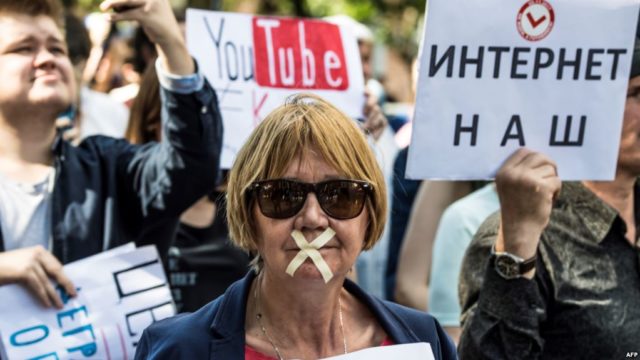
New Laws Represent Latest Effort by Moscow to Limit Public Dissent, Spark Mass Protests
By:

On March 18, Russian President Vladimir Putin signed laws prohibiting “obvious disrespect” to Russian authorities and the distribution of “untrue public information” (Novaya Gazeta, March 18). Effectively, these laws appear to introduce direct government censorship in Russia.
Kremlin propaganda itself facilitates the distribution of disinformation and false news stories. And yet, Moscow now plan to fight “untrue” information on the Internet, blocking access to those websites and blogs that criticize Kremlin policies. In addition, from now on, any criticism of Russian authorities considered “obvious disrespect” and an “insult to the state” will be met with fines of up to 300,000 rubles (more than $4,500) or even imprisonment.
Indeed, Russian authorities are already pursuing and even imprisoning oppositionists for publishing online content considered seditious; but so far these actions have been selective and justified by the “struggle against extremism.” Even so, Russian social media users will now have to avoid being overly critical of the Kremlin, or risk having their profile, website, or blog blocked by Roskomnadzor.
Before passage of the laws, various civil society organizations, journalists and writers actively voiced their opposition to these bills. In their opinion, the new laws will open the way for government repression of select areas of Russian society (Colta.ru, March 12). However, their overtures were largely ignored by the authorities.
At 33 percent, Putin is experiencing the lowest trust rating of his entire presidency (Svoboda.org, January 18). Therefore, the Putin regime may be requiring “respect” through possible repression in order to quell popular strife. Though, at the moment, the Kremlin lacks the resources to engage in mass repression against Internet users, due to growing protests in various regions of Russia.
Nevertheless, the judicial application of the new laws has already begun. Russian courts now require bloggers to refute “wrong” information. This recently happened in the Komi Republic, where one mother of a prisoner wrote on social media about the decrepit conditions of her son’s detention in a colony. The administration of the colony appealed to the court, which ruled that some of the mother’s expressions were “too harsh and unreasonable.” The court ordered her to publish a refutation, or face a large fine or even a criminal case (Rossyiskaya Gazeta, March 18).
The Russian public has not been quiet on the issue. Civil protests against the legal constraints began even before the new laws came into force. For example, a mass rally was held in Moscow (Interfax.ru, March 10). On a picket line in Belgorod, one of the participants held a poster with words attributed to Cicero: “The closer the collapse of empire, the crazier its laws” (Region.expert, March 19). More such demonstrations can be expected in the coming months.



